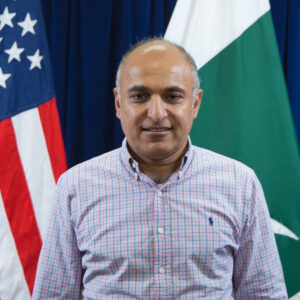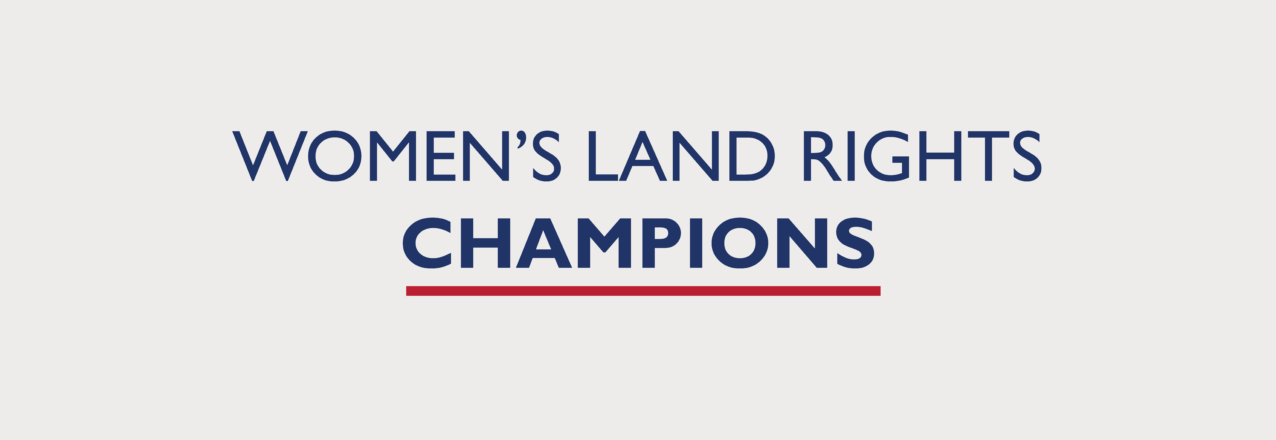This interview with Altaf Afridi, USAID/Pakistan, is part of USAID’s Land and Resource Governance Division’s Women’s Land Rights Champions series, which profiles staff across USAID Missions and operating units who are working to advance women’s land rights.
 Tell us about yourself.
Tell us about yourself.
My name is Altaf Afridi. I work as a Development Assistance Specialist at USAID/Pakistan. Currently, I manage the Land Registration in Merged Areas (LRMA) project. I am a governance specialist and have designed and managed governance projects throughout my career. In addition to managing LRMA, I also supervise another USAID governance project called Merged Areas Governance Program implemented by UNDP. Prior to my role at USAID, I worked as a Governance Officer at the Pakistan Resident Mission of the Asian Development Bank (ADB). At ADB, I managed the implementation of a large loan program called Decentralization Support Program and implemented a number of supporting technical assistance projects.
Why are women’s land rights and resource governance important to your work? And to other USAID development work?
Pakistan ranks among the world’s lowest in gender equality and women’s rights. This is especially true for the tribal regions, which recently merged into the Khyber Pakhtunkhwa (KP) Province. Here, as per the tribal code, land is owned collectively by tribes, sub-tribes, and clans. Women do not have any role in decision making in this patriarchal and conservative society. Therefore, they have virtually no control over land. To address this, USAID/Pakistan is assisting the provincial government of KP in establishing a land registration system with special emphasis on women’s access and control over assets.
What are some of the biggest challenges in helping women secure land rights and what are some things being done to overcome them?
In 2018, the Parliament of Pakistan passed a constitutional amendment to merge the Federally Administered Tribal Areas (FATA) along the Pakistan-Afghanistan border into the neighboring Khyber Pakhtunkhwa (KP) Province. This region is now known as Merged Areas (or Merged Districts) and is part of KP Province. Historically, this particular region was governed through uncodified tribal traditions and was not under the legal jurisdiction of Pakistan law.
The cultural norms and traditions prevailing in Pakistan in general, and in Merged Areas in particular, pose the biggest challenge in helping women secure land rights. Although the Government of Pakistan has legislated extensively to ensure clear inheritance and land rights pathways for women, local men and women are mostly unaware of these laws. The government has lacked the capacity to raise sufficient awareness to effectively implement the new laws.
USAID/Pakistan, through LRMA, is helping the Government of Pakistan bolster communications about the land laws and provide community outreach that educates local communities about the importance of women’s land rights. Because literacy is low, LRMA is developing and disseminating easy-to-understand communication products like thematic songs, radio programs, Public Service Announcements, illustrations, instructional videos, and live sessions featuring youth from Merged Areas.
LRMA is also building capacity within the Government of Pakistan to support implementation of the new legislation. LRMA has been conducting a review of the relevant laws, regulations, and policies, and has been recommending relevant amendments to help increase uptake and effectiveness of the laws. LRMA has also been designing and delivering trainings and developing materials like manuals and posters to help raise awareness among government staff, as well as providing equipment and hardware where required.
What are some of USAID’s successes in the area of women’s land rights?
LRMA is USAID/Pakistan’s first and only activity on land rights and there have been several successes. LRMA has conducted capacity building activities for relevant government officials as well as sessions with community leaders to raise awareness of women’s land rights.
In addition, the project also recently signed a memorandum of understanding (MOU) with the KP Province Ombudesperson, who is entitled to take action when women’s land rights are denied. As a result, LRMA has set up a legal library in the Ombudsperson’s office to support the capacity of the pro bono lawyers working there. To fill the information gap and inform the public about the new role of the Ombudsperson, LRMA has provided ten “knowledge corner” kiosks to showcase printed information, education, and communications materials on women’s land rights, including inheritance rights.
LRMA has also developed a video documentary that features two case studies about women litigants who have experienced barriers in registering their property. The documentary will be widely disseminated through two Pashto language satellite/cable TV channels (with wide outreach in Merged Areas) and through various social media platforms.
Is there anything else you’d like to share?
The project is still new. We look forward to sharing more substantial results down the road.


